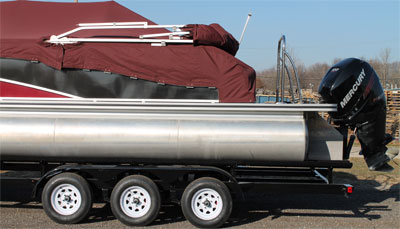Trailer capacity is easy to figure, but different
manufacturers rate their pontoon trailer capacity in different (often
inaccurate) ways. Capacity is limited by the strength of the axles; the
strength or rating on the spindles and hubs and then by the rating of
the tires. A trailer with a #3500 axle can carry #3500., but the
actual carrying capacity may be lower because of the rating of the
tires.
If the tires have a capacity of only #1300 (each) the pontoon trailer
capacity is reduced to the lower capacity of the tires. (for a single
axle trailer-#2600). There are other considerations, the strength of the
frame and bunks, but these factors are difficult to determine. It’s easy
to learn the true capacity of trailers. Check the rating, stamped on the
axle and read the side wall of the tires. Some pontoon trailer
manufacturers overate their trailers capacity. It’s a common practice to
add #250-#300 to the capacity because that could be the amount of tongue
weight on the hitch and it might eliminate weight on the trailer. We
don’t use that method. Our trailers have sufficient capacity that we
don’t have to add factors that may or may not be accurate. Carrying Capacity Once you know the capacity of the pontoon trailer, you can
arrive at the carrying capacity. This is the figure that you should be most
concerned with and again, is sometimes difficult to determine. The carrying
capacity is arrived at by deducting the weight of the trailer from the
lowest capacity of the axle or tires. Our PT-20/13 single axle pontoon
trailer has a #3500 capacity axle but the tires limit the capacity to #3320.
The trailer itself weighs #700 (the weight is on title), thus there is
#2520 of capacity left to carry a pontoon boat. PMI Trailer components
Why should I care about overloading a pontoon trailer? If you're not going very far and using your pontoon trailer
infrequently you can probably get by with an overloaded trailer. It will
wear the tires, burn up the bearings and the seals, but if you don’t use
it much, failure will probably be the second owners problem. However if you
tow frequently, tires will overheat and wear prematurely. Bearings will
overheat and grease will dissipate more quickly than normal. The bearings
will fail potentially scoring the axle and leading to a costly repair. This
usually happens on the second day of your vacation and you will be broken
down a hundred miles from home. (only kidding, but you get the point) Loading Capacity These two photos below illustrate the potential for overloading a trailer. It’s the same pontoon boat in both photos, it weighs about #4500. The tandem axle trailer on the left has the springs compressed almost to the point where the tires could rub the fenders. (about 1” away) The triple axle (#6000 capacity) trailer could care less about the #4500 load, the tires are 3” from the fenders.
|
|||||||||||||||||||
For Information Call (877)294-3395 or (574)294-3386 |
|||||||||||||||||||
 Trailers for Pontoons
Trailers for Pontoons
For all your Pontoon Trailer Needs!
(800)877-1544 - (574)294-3386
(800)877-1544 - (574)294-3386



